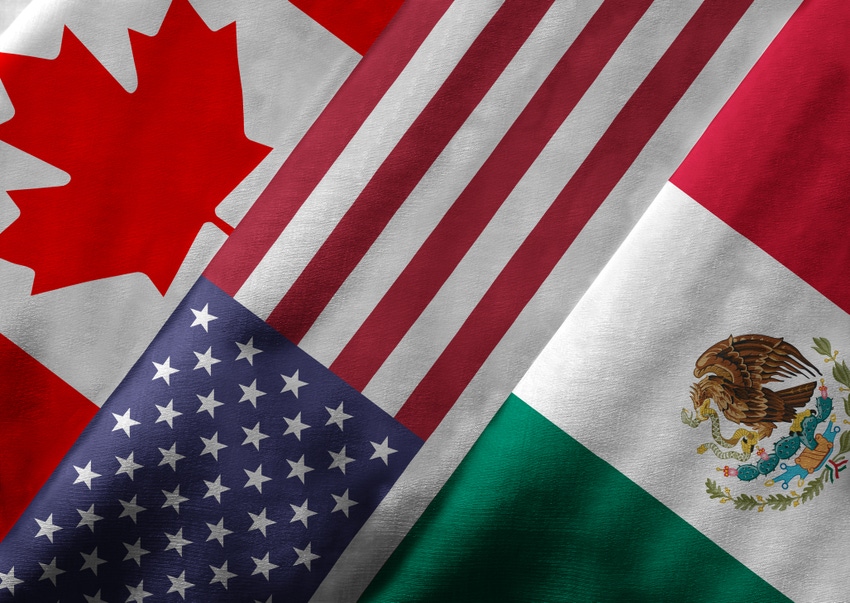
In a discussion fueled with rhetoric and rumors, the Trump Administration has set the official ball in motion on renegotiating the North America Free Trade Agreement. For agriculture, it is all about preserving the beneficial relationship experienced over the past two decades.
The Trump administration formally notified Congress of its intent to renegotiate the North American Free Trade Agreement (NAFTA) as required under the fast-track Trade Promotion Authority requirements. The notification starts a 90-day consultation period with Congress and stakeholders, with published comprehensive summaries of its specific goals for the renegotiation presented 30 days before it can begin formal negotiations.
“We intend to initiate negotiations with Canada and Mexico as soon as practicable, but no earlier than 90 days from the date of this notice,” said newly sworn in U.S. Trade Representative Robert Lighthizer in a letter to House and Senate leaders with jurisdiction over trade.
Lighthizer wrote the aim is that “NAFTA be modernized to include new provisions to address intellectual property rights, regulatory practices, state-owned enterprises, services, customs procedures, sanitary and phytosanitary measures, labor, environment and small and medium enterprises.”
Agricultural groups were quick to call for a cautious approach to modernizing NAFTA as not to disrupt the great trading relationship already in place with Mexico and Canada when it comes to agricultural trade.
Since NAFTA went into effect Jan. 1, 1994, U.S. trade north and south of the borders has more than tripled, growing more rapidly than U.S. trade with the rest of the world. Canada and Mexico are the two largest destinations for U.S. goods and services, accounting for more than one-third of total U.S. exports, adding $80 billion to the U.S. economy and supporting more than 3 million American jobs, according to data from the Office of the U.S. Trade Representative. In fact, U.S. manufacturing exports to Canada and Mexico have increased nearly 260% over the past 23 years, and U.S. farm exports to the countries have grown by more than 150%.
“Canada and Mexico are top pork export markets. We absolutely must not have any disruptions in exports to our No. 2 (Mexico) and No. 4 (Canada) markets,” said National Pork Producers Council president Ken Maschhoff, a pork producer from Carlyle, Ill. NPPC committed to work with the administration to preserve tariff-free market access for U.S. pork exports to Canada and Mexico, which last year were almost $799 million and nearly $1.4 billion, respectively.
Chip Councell, chairman of the U.S. Grains Council (USGC) and a farmer on the Eastern Shore of Maryland said the top priority of the modernization is maintaining this market access and keeping in place what has already been established with customers. “For instance, all corn products currently go into Mexico and Canada duty-free, with sales last marketing year of $2.7 billion in commodity corn alone. That demand is an essential part of ensuring farmers can continue to farm in this economy,” he said.
“If the administration intends on renegotiating NAFTA, it must guarantee growers that new terms won’t reverse the significant benefits for U.S. wheat farmers, like duty free access,” said David Schemm, a wheat farmer from Sharon Springs, Kan., and National Assn. of Wheat Growers president. “Despite the risks, there’s an opportunity here to get better trade rules in place that will set the gold standard for trade agreements going forward, without hurting wheat farmers and their importing customers.”
NAWG in a joint statement with the U.S. Wheat Associates said negotiating a new NAFTA certainly can make improvements. “A good place to start are the sanitary and phytosanitary (SPS) rules that the three countries already agreed to as part of the Trans-Pacific Partnership (TPP) negotiations,” the statement said.
“The Trump Administration understands that NAFTA has been an unequivocal success story for American agriculture,” said National Corn Growers Assn. president Wesley Spurlock. “Exports are one pillar of a strong farm economy, accounting for 31% of farmer income. Nowhere is the importance of trade stronger than right here in North America. Since NAFTA was implemented, U.S. agricultural exports to Canada and Mexico have tripled and quintupled, respectively. We export billions of dollars of corn and corn products to these countries each year.”
The Institute for Agriculture and Trade Policy said what the administration hopes to accomplish remains a mystery. “Last month’s leaked draft of U.S. objectives in NAFTA renegotiation showed that Trump was breaking his campaign promise to take a different approach to trade, instead relying on the same failed strategies of the Trans-Pacific Partnership, which he railed so loudly against. The contradictory views confusing chain of command within the administration leave more questions than answers about the coherence and seriousness of any negotiating objectives,” IATP said.
Their goals within NAFTA include restoring local and national sovereignty over farm and food supply, including requiring Mexico and Canada to withdraw their challenges to country of origin labeling for meat. The National Farmers Union said the challenge from Mexico and Canada ultimately convinced Congress to repeal COOL.
“We can not allow the interests of foreign governments and companies to dictate our laws here at home,” said NFU president Roger Johnson. “The COOL repeal is the perfect example of just how much of our sovereignty we’ve traded away in decades of trade deals. This issue must be addressed in the NAFTA renegotiation. Any provisions keeping the U.S. from instituting COOL or any other commonsense law need to be struck from all of our trade agreements.”
About the Author(s)
You May Also Like






